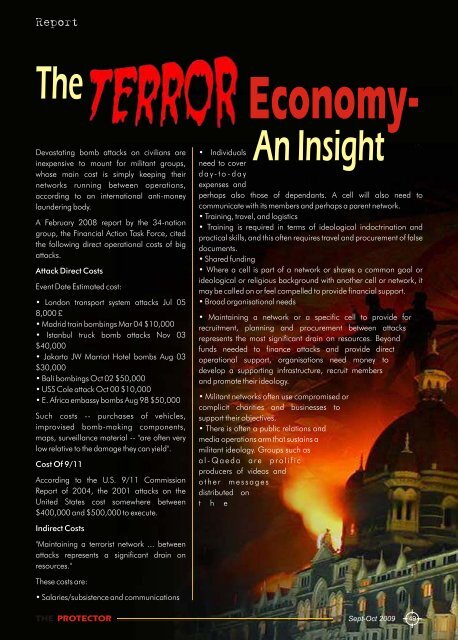protector full 1234....cdr - The Protector
protector full 1234....cdr - The Protector
protector full 1234....cdr - The Protector
You also want an ePaper? Increase the reach of your titles
YUMPU automatically turns print PDFs into web optimized ePapers that Google loves.
Report<br />
<strong>The</strong> Economy-<br />
Devastating bomb attacks on civilians are<br />
inexpensive to mount for militant groups, An Insight<br />
• Individuals<br />
need to cover<br />
whose main cost is simply keeping their day-to-day<br />
networks running between operations, expenses and<br />
according to an international anti-money perhaps also those of dependants. A cell will also need to<br />
laundering body.<br />
communicate with its members and perhaps a parent network.<br />
A February 2008 report by the 34-nation<br />
group, the Financial Action Task Force, cited<br />
the following direct operational costs of big<br />
attacks.<br />
• Training, travel, and logistics<br />
• Training is required in terms of ideological indoctrination and<br />
practical skills, and this often requires travel and procurement of false<br />
documents.<br />
• Shared funding<br />
Attack Direct Costs<br />
• Where a cell is part of a network or shares a common goal or<br />
Event Date Estimated cost:<br />
ideological or religious background with another cell or network, it<br />
may be called on or feel compelled to provide financial support.<br />
• London transport system attacks Jul 05 • Broad organisational needs<br />
8,000 £<br />
• Madrid train bombings Mar 04 $10,000<br />
• Istanbul truck bomb attacks Nov 03<br />
$40,000<br />
• Jakarta JW Marriot Hotel bombs Aug 03<br />
$30,000<br />
• Maintaining a network or a specific cell to provide for<br />
recruitment, planning and procurement between attacks<br />
represents the most significant drain on resources. Beyond<br />
funds needed to finance attacks and provide direct<br />
operational support, organisations need money to<br />
develop a supporting infrastructure, recruit members<br />
• Bali bombings Oct 02 $50,000 and promote their ideology.<br />
• USS Cole attack Oct 00 $10,000<br />
• E. Africa embassy bombs Aug 98 $50,000<br />
• Militant networks often use compromised or<br />
complicit charities and businesses to<br />
Such costs -- purchases of vehicles, support their objectives.<br />
improvised bomb-making components, • <strong>The</strong>re is often a public relations and<br />
maps, surveillance material -- "are often very media operations arm that sustains a<br />
low relative to the damage they can yield". militant ideology. Groups such as<br />
Cost Of 9/11<br />
al-Qaeda are prolific<br />
producers of videos and<br />
According to the U.S. 9/11 Commission other messages<br />
Report of 2004, the 2001 attacks on the distributed on<br />
United States cost somewhere between<br />
$400,000 and $500,000 to execute.<br />
t h e<br />
Indirect Costs<br />
"Maintaining a terrorist network ... between<br />
attacks represents a significant drain on<br />
resources."<br />
<strong>The</strong>se costs are:<br />
• Salaries/subsistence and communications<br />
THE PROTECTOR<br />
Sept-Oct 2009 49


